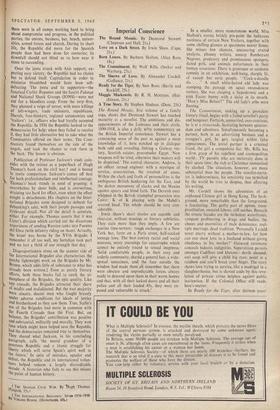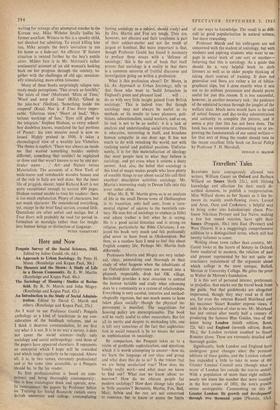Imperial Conscience
The Round Mosaic. By Desmond Stewart. (Chapman and Hall, 21s.) The Sinews of Love. By Alexander Cordell. (Gollancz, 21s.) A True Story. By Stephen Hudson. (Dent, 253.)
The Round Mosaic, first volume of a family saga, shows that Desmond Stewart has reached maturity as a novelist. The ambitions and dis- appointments of the Lomaxes and their circle, 1890-1918, is also a drily witty commentary on the British Imperial conscience. Stewart has a convincing sense of the past as against a mere knowledge of it, here notched up in dialogue both odd and revealing. linking a Galway rec- tory, Scottish estates, proconsular Egypt. 'New weapons will be tried, otherwise their makers will be dispirited.' The central character, Andrew, is an officer turned engineer with a mystique of service, construction, the creation of oases. Within the clash and froth of personalities is the ambiguous British hankering for the East, and the darker movement of clocks and the Maxim against spears and blind faith. The Dervish emir whipped in the British triumphal procession into Cairo: K of K playing with the Mandi's severed head. The whole should be very con- , siderable.
Irwin Shaw's short Stories are capable and clear-cut, without musings or literary subtleties. They state more than they imply. A few are routine time-servers: tough exchanges in a New York bar, farce on a Paris street, half-cocked teenage love. The best convey racial and social neurosis, misty yearnings for catastrophe which cannot be entirely traced to sexual ineptness. 'Solid comfortable people, in their cosy and orderly community, shared a general fear, a wide- spread uneasiness. and the face outside the window had made them all, remember that there were obscure and unpredictable forces always ready to descend upon them in their warm homes and that, with all their locked doors and all their police and all their loaded 45s, they were ex- posed and vulnerable to attack.' In a smaller, more monotonous world, Miss Skelton's stories briskly pin-point the ludicrous nastiness of certain New Yorkers, together with some chilling glances at specimens nearer home. She misses few chances, uncovering crazed analysts, phoney writers, uneasy flamboyant Negroes, predatory and promiscuous spongers, dazed girls, and animals unfortunate in their human associates. There is grotesque or sardonic comedy in an exhibition, well-hung, sharply lit, of vacant but eerie people. "Cock-a-doodle do. . ." A small white-haired old lady was stomping the passage on squat swansdowne trotters. She was clasping a hypodermic and a pink Easter bunny , with a daisy in its mouth. "How's Miss Belsen?" The old lady's orbs were flaming.'
The Commitment, stoking up a prevalent literary ritual, begins with a failed novelist's party and hangover. Fortyish, unmarried, over-cautious, he is at a crossroads, hesitating between spinster- dom and adventure. Simultaneously becoming a partner, both in an advertising business and a croupier's girl, he gets tangled within false appearances. The jovial partner is a criminal fraud, the girl a compulsive liar. Mr. Rilla has a firm grasp of his repellent and cosmopolitan world : TV pundits who are university dons in their spare time; the rich at Christmas immunised by alcohol. The situations, however, are more substantial than the people. The novelist-narra- tor is indeterminate, his sensitivity too tarnished by the world he tries to despise, thus affecting his writing.
Mr. Cordell shows the adventures of an orphaned Chinese girl in Hong Kong. The back- ground, more remarkable than the foreground, is fascinating. The guilty past of opium, mass- prostitution, sweated labour, still seethes. Beneath the ornate façades are the turbulent waterfronts, rampant profiteering in drugs and bodies, the abuses and enormities of male dominance, mul- tiple marriage, dead tradition. 'Personally I could never marry without a mother-in-law, for how can one show love to a husband without giving obedience to his mother?' Outward ceremony conceals hideous indignities. Superstition persists amongst Cadillacs and klaxons: devils abound; owl soup will give a child big eyes; point at a rainbow and you'll break your finger. The story shows love trying to survive, like a madrigal in a slaughter-house, but is shoved aside by this reve- lation of private virtue helpless against- public inattention. If the Colonial Office still reads, here's matter.
In Ready for the Tiger, after thirteen years'
waiting for revenge after attempted murder in the Korean war, Mike Webster finally knifes his former assailant. Witness to this is a spooky child, not shocked but admiring. To avoid killing him too, Mike accepts the boy's invitation to use his home as a hide-out. An efficient 'B' feature situation is twisted further by the boy's nubile sister. Milder fare is in Mr. Mottram's rather sentimental account of an old woman's looking back on her progress through the century, to- gether with the challenges of old age, occasion- ally stimulating, more often tiresome.
Many of these books surprisingly relapse into ready-made perceptions. 'This struck so forcibly,' 'the mists of time' (Mottram). 'Mists of Time,' 'Woof and warp of time' (Rilla). 'Glued to the juke-box' (Skelton). 'Something inside me snapped' (Ross). Nor is A True Story impec- cable. 'Glorious view,' Heart of lead,' Mys- terious workings of fate,' Eyes still glued to the telegram.' Stephen Hudson, as every school- boy doubtless knows, translated the last portions of Proust: his own massive novel is now re- issued. Highly praised in 1930, it takes a chronological view of a wealthy late Victorian. The theme is explicit. 'There was always an inside me that wanted something besides entirely different, something that couldn't be explained or done and that wasn't known to me by any par- ticular name. . . .' Art and Nature versus Materialism. The accounts of a New York of mule-teams and ramshackle wooden houses and of the rich in Italy are well done. But the inner life of priggish, decent, tepid Richard Kurt is not quite exceptional enough to sustain 600 pages. Hudson seemed unable to trust his readers: there is too much explanation. Plepty of characters, but not much character. He remembered everything, yet, except in the brief final section, created little. Quotations are often unfair and malign, but A True Story will probably be read for period in- formation or nostalgia rather than for insight into human beings or distinction of language.
PETER VANSITTART































 Previous page
Previous page